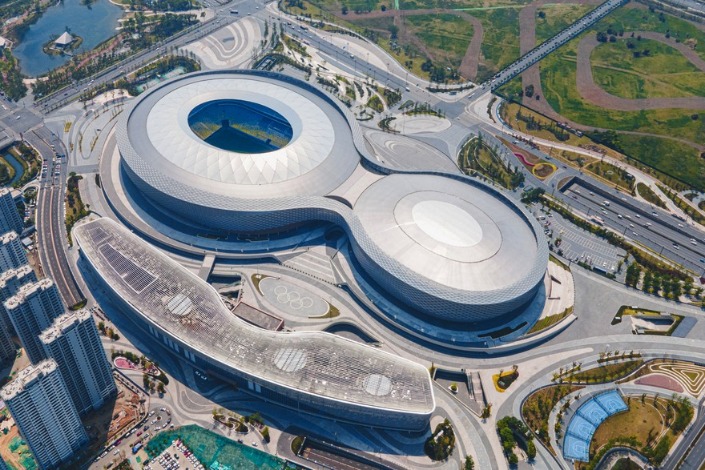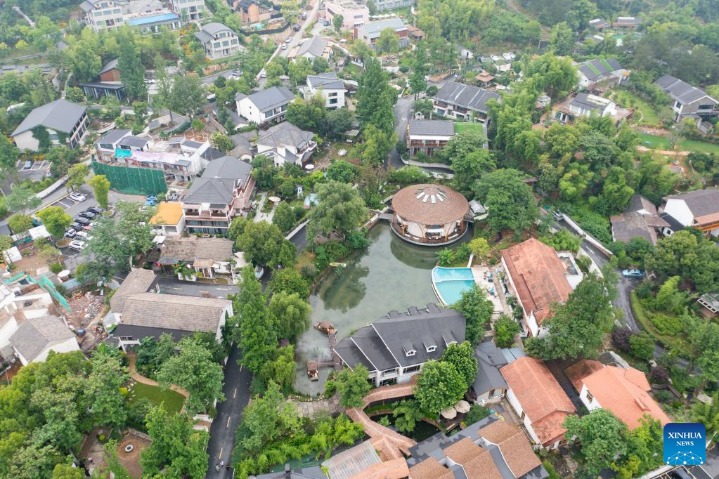Industrial makeover provides jobs for local people
By LI LEI and YANG JUN | China Daily Global | Updated: 2023-07-19 09:18

Bijie was once a major mining area tucked away among the rugged karst mountains of Guizhou, a southwestern province that is mineral rich but environmentally vulnerable.
In recent years, the city of 9.5 million population — a sizable number of whom have recently been lifted out of poverty — has worked to phase out some of its most polluting industries, including old-fashioned mines.
To replace lost revenue, authorities introduced businesses that help process local raw materials, ranging from farm produce to minerals to make consumer goods with higher added value.
"Since 2021, we have made notable progress in attracting labor-intensive manufacturers," said Lyu Yong, director of Bijie's investment promotion bureau.
The shift is part of broader efforts by local authorities to overhaul the city's industrial makeup in line with the nation's push to promote greener lifestyles and working practices.
Lyu said Bijie has a large population, but many people live in the rural areas, meaning the general workforce has low levels of training. With that in mind, his office has worked with counterparts in wealthier regions — such as Dongguan, a manufacturing hub in Guangdong province — and signed contracts with hundreds of businesses to open plants in Bijie.
He described the strategy as "trading the market and resources for industry and investment", and said it has brought nearly 350 investment projects worth 66.4 billion yuan ($9.2 billion), while creating 16,600 jobs.
"The screening criteria are if the businesses can help promote economic growth, improve the industrial makeup, create enough jobs, make the most of local resources, and if their market expectations are good," Lyu said, adding that heavily polluting businesses are not welcome.
Lianshang Technology, which makes a range of LED lighting products, is one of the companies that have set up operations in Bijie in recent years.
"Our company has kept R&D work at our headquarters in Shenzhen, Guangdong, and moved all the assembly lines to Bijie," said Dai Xiaoling, who oversees financial matters at Lianshang's operations in the city.
Lianshang's assembly lines in the city were set up in 2015, and they employ 170 workers with an average age of 35. The overwhelming majority of the employees did not attend university, she added.
Labor-intensive employment, such as that offered by Lianshang, used to be situated in the economically vibrant Pearl River Delta in Guangdong, a coastal province, from where containers of manufactured goods are shipped worldwide.
However, the westward flow of such plants is picking up momentum as wealthier regions shift their focus to research and other sectors with higher added value.
The companies' presence in Bijie has generated wide-ranging benefits, such as saving the less-educated locals the trouble of seeking work hundreds or even thousands of kilometers away, and offering a stable source of income.
Wang Mei, 30, began work as an accountant at Lianshang last year. The mother of three had worked for a couple of smaller companies since she graduated from a local university in 2016.
"I like the stability offered by larger employers such as Lianshang," she said, recalling that the smallest company she worked for only had 10 employees, but one day it shut down because of financial troubles. Wang was owed two months' salary, but she never received the money. She described the loss as a frustrating experience, especially for people like her, who have both seniors and young children to support.
"At least employers the size of Lianshang can ensure that I get paid on time," she said.
Wang declined to give details of her salary, but she said it rose markedly after she started working for Lianshang, and it is now above the average in Bijie. She added that the newly gained sense of security has allowed her to prepare for accountancy exams, which could help her secure promotions in the future.
The jobs-introduction program was part of a larger move by formerly poverty-stricken areas to "stabilize employment" and "bolster incomes" for local people, some of whom have nominally crossed the poverty line but remain vulnerable to sliding back into financial troubles.
Official data show that last year the per capita net income of formerly impoverished families in Bijie rose by 15.5 percent year-on-year. Meanwhile, the per capita disposable income in rural areas was 1.42 times higher than in 2018 — more than the rise of 1.31 times enjoyed by their urban counterparts. Also, the city's GDP last year was 1.26 times higher than in 2018.
























